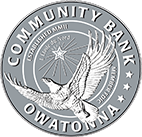Protecting Yourself and Your Money
Online Transactions
Federal financial regulators report that Internet threats have changed significantly over the past several years. Sophisticated hacking techniques and growing organized cyber-criminal groups are increasingly targeting financial institutions, compromising security controls, and engaging in online account takeovers and fraudulent electronic funds transfers.
In order to help ensure the security of your online transactions, we want you to know that we will never email, call or otherwise ask for your username, password or other electronic banking credentials.
Tips for Safe Online Banking
You can help protect yourself by implementing alternative risk control and processes, such as:
- Choosing an adequate username and password that, at a minimum, mixes in lowercase letters, uppercase letters and numbers
- Periodically changing your password (e.g. at least every 90 days)
- Safeguarding your username and password information
- Having current anti-malware and anti-virus software
- Making sure you have a firewall in place when conducting your financial transactions
- Logging off the system when you’re done conducting business, not just closing the page
- Monitoring your account activity on a regular basis
Tips for Safe Online Business Banking
We may require owners of commercial accounts to perform their own risk assessments and control evaluations. For example:
- A list of the risks related to online transactions that your business faces, including:
- Passwords being written down and left out in the open
- The use of old or inadequate passwords
- The possibility of internal fraud or theft
- Delays in terminating the rights of former employees
- The lack of dual control or other checks and balances over individual access to online transaction capabilities
- An evaluation of controls your business uses, such as:
- Using password-protected software to house passwords
- Conducting employee background checks
- Initiating a policy and process to terminate access for former employees
- Segregating duties between two or more people so no one person has too much access or control
- Conducting internal or third-party audits of controls
- Using firewalls to protect from outside intrusion or hackers
Federal Protection
Federal regulations provide consumers with some protections for electronic fund transfers. These regulations generally apply to accounts with Internet access.
For example, these federal laws establish limits on a consumer’s liability for unauthorized electronic fund transfers. They also provide specific steps you need to take to help resolve an error with your account.
Note, however, that in order to take advantage of these protections, you must act in a timely manner. Make sure you notify us immediately if you believe your access information has been stolen or compromised. Also, review your account activity and periodic statement and promptly report any errors or unauthorized transactions. See the Electronic Fund Transfer disclosures that were provided at account opening for more information on these protections.
If you become aware of suspicious account activity, you should immediately contact the authorities and contact us.
Fake Check Scams
Did someone send you a check and ask you to send some money back? That's a scam! Did you win a prize and are told to send back taxes and fees? Did you get paid as a "secret shopper" and are told to wire back money? Did you sell an item online and did the buyer overpay? These are scams! Learn more about Fake Check Scams.
Identity Theft
Identity theft and financial fraud can have a serious impact on the lives of consumers left on their own to deal with restoring their identity. The process severely disrupts personal and professional life; it can take months or even years to repair the damage. Learn more about Identity Theft and Fraud.
Before you become a vicitm learn more about Community Bank Owatonna's Identity Theft Protection program through ID TheftSmart™.


